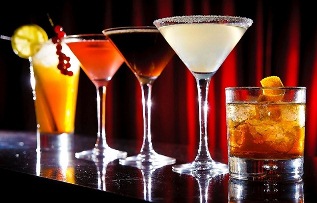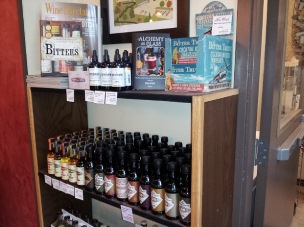As Edmonton’s drink-mixing community experiences rapid growth, deVine Wines has you covered with all of your bartending needs. This includes top-quality spirits, wonderfully smooth vermouths and liquors, and of course the expert mixer’s final touch – digestifs and bitters! For those unfamiliar with just what constitutes a “bitter”, we’re not talking about the old – and incorrect – tongue diagrams taught to us all in elementary school (see graphic)
At their traditional roots, all bitters are simply an alcoholic preparation flavoured by some sort of botanicals which are predominantly bitter in flavour. The palates are very concentrated, highly aromatic, flavoured by a variety of vegetation found in nature such as herbs, roots, bark, and fruit.
The use and history of bitters took a long, varied and winding path to its current niche. We know for instance that the Ancient Egyptians infused sweet wines with medicinal herbs as early as 300CE. Pharmacognosy (a fancy term describing the study of naturally-derived medicines) took off as a healing technique in the Medieval Ages, which can be traced directly to charlatanism in Europe during the Renaissance and the Wild Western United States during the era of Manifest Destiny. So, in 17th century Italy or the 19th century Wyoming Territory, bitters were sold by con-men standing on soap boxes promising they held in their miracle cure-alls for any illness. Suffering from gout, constipation and headaches? Have Big Bill’s Best Bitters, (a real name) some ethanol flavoured by bark!

Rather than get run out of town, the masses gladly consumed these particular snake oils, mixing them into all sorts of mixed drinks and foods. In fact, by 1806 the name “bitters” was a mainstay – a key part of the “stimulating liquor, composed of spirits of any kind, sugar, water, and bitters,” called a cocktail. How did this happen? Well, from the 1850s in the 1930s a number of conservative morality and temperance movements altered public perception and/or the law to the point where only “medicinal” cocktails offered a legitimate option to consume alcohol in times when drinking was socially unacceptable or illegal. Antique bitters bottles from these eras have in fact become highly collectable items in their own right. The bottles were often colourful, creatively named, came in a wide array of different shapes and sizes, and included ridiculous marketing claims.
Some of the most popular bitters on the 1800s are still popular today, and were initially created with medicinal purposes in mind. Angostura bitters (now technically a supermarket product) are named after a Venezuelan town and were mixed together by as German physician to cure seasickness. Today’s nervous flyers occasionally find the same cocktails helpful to cure their anxieties, proving the adage of “a drink to calm one’s nerves” may occasionally have something to it after all. Due to the stronger, more intense flavour concentrations in addition to the high alcoholic proofs of most “original” bitters, many are used in small “dashes” or with droppers to flavour cocktails and thus are often called cocktail bitters.
By incorporating themselves into cocktail culture, bitters were reborn into an entirely new and lasting niche. In cocktails, bitters are best used for their ability to enhance a good mixed drink into a beautifully aromatic, balanced, and unforgettable one. One or two dashes of orange bitters, for instance, can blend seamlessly into a classically floral dry martini. With many varieties and hundreds of herbal, woody or floral ingredients, cocktail bitters can also provide a nearly unlimited number of flavouring possibilities above and beyond simple drink balancing to enhance the character of cocktails.
Finally, any bitters blog would be remiss to exclude digestifs, the less alcoholic and intense cousin of cocktail bitters. Digestifs have enjoyed their own renaissance in the cocktail community as herbal liquors like Jägermeister make their way out of nightclub shot glasses and into bartending mixers. Nowhere is this more apparent than with Italian Amari. Amari (the plural of Amaro, Italian for – you guessed it – “bitter”), are a family of spirits which are encouraged for their digestive qualities. Yes, the unproven allure of health benefits in alcohol continues. Aperol is a popular and less bitter Amaro which originated from the city of Padua in the early 20th century, and its bitter orange flavour is often mixed with Prosecco to create a Aperol Spritz. The similarly styled Campari from Milan can make a wonderful Americano when paired with sweet vermouth, or add gin to create a Negroni! The herbal and vegetal Cynar shows off the range of Amaro, Fernet Branca treads the line between cocktail bitters and digetifs because while pleasantly potable on its own, the higher proof, viscous quality, and aromatic menthol and eucalyptus flavours are often associated with cocktail bitters. In order to understand it, you almost need to try it. Some premium Amari such as Berta or Ischia Sapori Rucolino are often simply enjoyed on their own.
The world of bitters, cocktails, and mixology is diverse, complex, and growing. Every aspect of the culture, from tonic and liquor preferences to mixing style has been subject to debate and further examination. But enough for one blog! While entire books have been written on the subject, we hope this small introduction can inspire you to explore the range of offerings available today.
New Cocktail Bitters at deVine Wines & Spirits:
Scrappy’s Firewater Bitters – 150mL – $22.99
Scrappy’s Cardamom Bitters – 150mL – $22.99
Scrappy’s Lime Bitters – 150mL – $22.99
Scrappy’s Lavender Bitters – 150mL – $22.99
Scrappy’s Seville Orange Bitters – 150mL – $29.99
Scrappy’s Mixed Pack Bitters – 4x15mL – $29.99
Bittermens Orange Cream Citrate Bitters – 150mL – $22.99
Bittermens Celery Shrub Bitters – 150mL – $22.99
Bittermens Hopped Grapefruit Bitters – 150mL – $22.99
Bitter Truth Spiced Chocolate Bitters – 200mL – $32.99
Bitter Truth Creole Bitters – 200mL – $32.99
Bitter Truth Lemon Bitters – 200mL – $32.99
Bitter Truth Bitters Travel Pack – 5x20mL – $39.99
And there’s much more at deVine’s, so drop in to visit our Bitters section..
